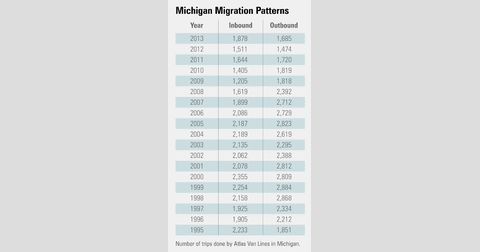Michigan Finally Reverses the Number of People Leaving
State lost more people than it gained to migration every year from 1996-2011
(In a Sept. 23 interview, the Democratic candidate for lieutenant governor, Lisa Brown, said “I think the Granholm years, you know, weren’t as bad as we think.” This article is part of a Michigan Capitol Confidential series examining how the state’s economy actually fared during Michigan’s "lost decade.")
From 1996 to 2011, Michigan saw more people leaving the state than coming in, according to Atlas Van Lines, a moving company that tracks migration across the country. The last two-thirds of this period corresponded with an especially bleak time for Michigan’s economy.
By comparison, Atlas records for Ohio show more people moving into that state than out for 14 consecutive years, from 2000 to 2013. And Indiana only had one year from 1994 to 2013 when it didn’t have more people arriving than departing.
Michigan’s 16-year negative migration trend ended in 2012, when Atlas finally recorded more inbound moves than outbound. The net-positive inbound moves repeated in 2013.
According to the U.S. Census Bureau, Michigan’s population was 9.66 million in 1995, grew to 10.05 million in 2005, and then fell back to 9.90 million in 2013.
Moving company data is one source of information on population shifts. Another comes from the U.S. Internal Revenue Service. The Tax Foundation, an independent research organization located in Washington, D.C., used IRS data to create a map showing the financial impact of net outbound migration on Michigan (see nearby).
A related chart shows that from 2000 to 2010, there were 442,705 more individuals (listed as tax “exemptions”) who left Michigan for other states than came here. This resulted in an annual statewide loss of $14.4 billion worth of adjusted gross income (AGI) reported in Michigan, which was the 5th worst such loss in the U.S. during that 10-year span. (According to the Michigan Department of Treasury, Michigan households reported a total of $288.5 billion of AGI in 2012.)
Michael LaFaive, director of the Morey Fiscal Policy Initiative for the Mackinac Center for Public Policy, said there may not be a better single metric of economic well-being than migration. “Usually a move represents a vote in favor of more economic opportunities,” he said. “In the 2000s, Michigan was not considered an opportunity state, but Florida, Texas and Arizona were.”
The Tax Foundation’s IRS data shows that while Michigan lost nearly half a million people listed as tax “exemptions” during the 2000s, Florida added 966,934, Texas gained 807,552 and Arizona added 482,138.
Michigan Capitol Confidential is the news source produced by the Mackinac Center for Public Policy. Michigan Capitol Confidential reports with a free-market news perspective.


 Migration report shows Michigan is shedding people
Migration report shows Michigan is shedding people
 U.S. Census report for 2022 shows migration from Michigan
U.S. Census report for 2022 shows migration from Michigan
 Taxes matter to Michigan’s population growth
Taxes matter to Michigan’s population growth